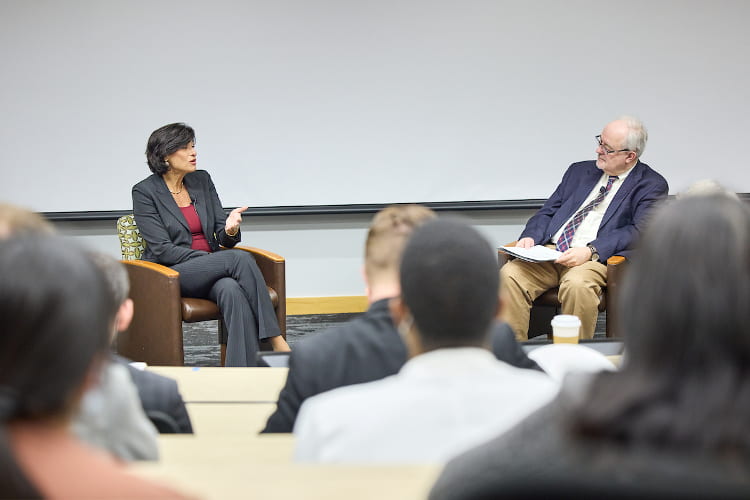Rochelle P. Walensky, MD, the director of the Centers for Disease Control and Prevention (CDC), visited Washington University School of Medicine last week to discuss lessons learned from the COVID-19 pandemic. As part of the Department of Medicine’s weekly Grand Rounds series, she sat down March 3 with William G. Powderly, MD, the J. William Campbell Professor of Medicine and co-director of the Division of Infectious Diseases for a conversation that highlighted the pandemic’s success stories and challenges. The event was livestreamed to the Medical Campus community and the public. A small group of infectious diseases physicians, fellows and residents attended in person.
A day earlier, she also met with women trainees and faculty in the Department of Medicine to discuss mentorship, leadership and professional development. The discussion was led by Rakhee K. Bhayani, MD, an associate professor of medicine and the director of the Forum for Women in Medicine, a group that supports the professional development of women trainees in the Department of Medicine.
Walensky, a Washington University alum, was invited to the Medical Campus as the Gerald Medoff Visiting Professor in the Department of Medicine. Medoff, who died in 2019, was a beloved, compassionate infectious diseases physician and former director of the Division of Infectious Diseases at the School of Medicine.
As part of the Grand Rounds conversation with Powderly, Walensky answered questions about the COVID-19 pandemic. An internationally recognized expert on HIV/AIDS, she noted that her experiences with that earlier epidemic influenced her thinking around the COVID-19 pandemic. The AIDS epidemic showed that infectious diseases weigh more heavily on some communities than others, and that this unequal burden is rooted in social inequities, she said.
“We learned so much from HIV in terms of who gets care and access to care,” Walensky said. “We in infectious diseases have long known that infectious diseases go not to places of wealth but to places of poverty and places that lack access to care. The first people who brought SARS-CoV-2 to the United States were people who traveled on airplanes, people who traveled on cruise ships, people who had the resources to do those sorts of things. But then it became a disease of the more vulnerable.”
Her experience with HIV/AIDS is part of the reason why she has prioritized addressing health inequity as CDC director, Walensky said.
“I’m proud to say that in April, just weeks after coming to the CDC, we at CDC declared racism a serious public health threat,” Walensky said. “We have spent a lot of time documenting the problem in health equity. You don’t have to look very far to see it’s true in maternal mortality, it’s true in chronic diseases, it’s true in access to care, it’s all true. And I said, ‘I don’t want to document the problem anymore. I want to implement things that will fix the problem.’”
